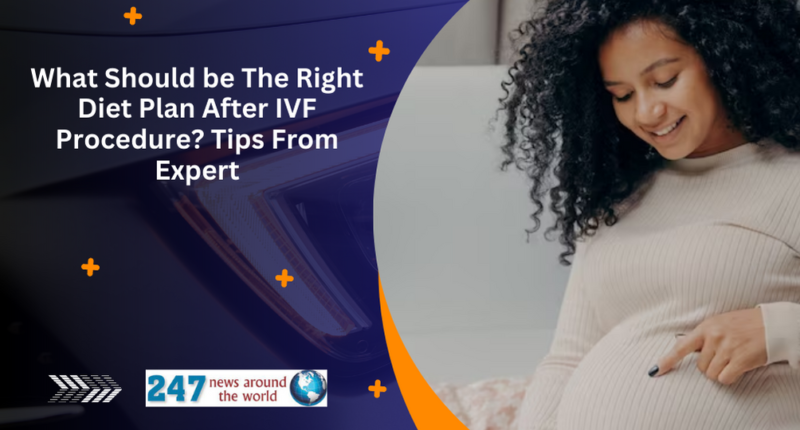What Should be The Right Diet Plan After IVF Procedure? Congratulations on completing your IVF procedure successfully! This is an exciting time in your life, and you may be wondering about the right diet to follow post-IVF to support a healthy pregnancy. Your diet plays a crucial role in optimizing your chances of conceiving and maintaining a healthy pregnancy. In this article, we will provide you with expert tips on crafting the right diet plan after an IVF procedure to enhance your overall well-being and improve your chances of a successful pregnancy.

What Should be The Right Diet Plan After IVF Procedure? Tips From Expert
“A baby fills a place in your heart that you never knew was empty.” – Unknown
Becoming a mother is indeed the greatest blessing the Almighty has bestowed upon women. A woman starts loving and caring for her baby right the moment when it is conceived. For the women who were not able to conceive regularly, the IVF procedure has come as a boon, allowing them to become a mother. If you’ve conceived your baby through IVF, then you need to keep extra care of yourself and your baby. Here in this article, we’ll discuss a diet plan which has especially been designed for mothers, which they should follow post the IVF procedure. Following this diet by Dr. Nishi Singh, Director- HOD(Department of Infertility & IVF) at Prime IVF, Delhi & Gurugram, would keep you as well as your baby healthy and in good shape, reducing any complications which might occur during pregnancy.
Don’t miss | 5 Reasons Why Overcooking of Food Should Be Avoided
There is no one-size-fits-all diet plan for everyone after IVF, but there are some general guidelines that can help you eat a healthy and balanced diet. These guidelines include:

1. Nourish Your Body with Nutrient-Dense Foods
After an IVF procedure, it’s essential to focus on nourishing your body with nutrient-dense foods. This means including a variety of fruits, vegetables, whole grains, lean proteins, and healthy fats in your diet. These foods provide essential vitamins, minerals, and antioxidants that support your reproductive health and strengthen your immune system.
2. Stay Hydrated
Proper hydration is essential for overall health, especially during pregnancy. Make sure to drink plenty of water throughout the day. Water helps in maintaining amniotic fluid levels, regulating body temperature, and supporting nutrient transportation to the fetus.
3. Include Folate-Rich Foods
Folate, also known as Vitamin B9, is a crucial nutrient for fetal development and reduces the risk of birth defects. Include folate-rich foods in your diet, such as leafy greens, citrus fruits, legumes, and fortified cereals.
4. Choose Healthy Sources of Protein
Protein is the building block of life and plays a vital role in the development of the baby’s organs and tissues. Opt for lean protein sources like poultry, fish, tofu, nuts, and beans.
5. Limit Caffeine Intake
While moderate caffeine intake may be acceptable, excessive caffeine consumption can interfere with fertility and increase the risk of miscarriage. It’s best to limit your caffeine intake during and after pregnancy.
6. Avoid Unpasteurized Foods
Pregnant women, including those who have undergone IVF, should avoid consuming unpasteurized dairy products and juices, as they may carry harmful bacteria that could pose a risk to the baby’s health.
Embrace Healthy Fats
Incorporate healthy fats like avocados, olive oil, nuts, and seeds into your diet. These fats are essential for the development of the baby’s brain and nervous system.
Go for Regular Prenatal Check-ups
Regular prenatal check-ups are crucial for monitoring your health and the baby’s progress. Work closely with your healthcare provider to ensure you are following the right diet and receiving the necessary prenatal supplements.
7. Manage Your Weight
Maintaining a healthy weight during pregnancy is essential for reducing the risk of complications. However, sudden weight loss or excessive dieting should be avoided, as it may harm your chances of conceiving.
8. Avoid Processed Foods and Sugary Drinks
Processed foods and sugary drinks offer empty calories and lack essential nutrients. Opt for whole, unprocessed foods to fuel your body with the right nutrients.
9. Engage in Light Exercise
Regular, gentle exercise can support a healthy pregnancy and reduce stress. Consult your healthcare provider to determine suitable exercises for your condition.
10. Manage Stress Levels
High-stress levels can negatively impact fertility and pregnancy. Practice relaxation techniques, such as yoga, meditation, or deep breathing, to manage stress effectively.
11. Enjoy Adequate Rest
Rest is crucial for the body to heal and restore itself. Ensure you get enough sleep and listen to your body’s needs.
12. Stay Away from Alcohol and Smoking
Both alcohol and smoking can harm fetal development and increase the risk of complications during pregnancy. It’s essential to avoid these substances entirely.
Note; If you have any questions about what to eat after IVF, be sure to talk to your doctor or a registered dietitian. They can help you create a personalized diet plan that is right for you.
Don’t miss | 9 Important Mistakes People Make When Managing Type 2 Diabetes
Here are some additional tips for eating a healthy diet after IVF:

- Listen to your body. If you’re feeling nauseous or tired, eat small, frequent meals.
- Cook at home. This way, you can control the ingredients in your food.
- Read food labels. This will help you make informed choices about what you eat.
- Don’t be afraid to ask for help. If you’re struggling to eat a healthy diet, talk to your doctor or a registered dietitian.
Following a healthy diet after IVF can help improve your chances of a successful pregnancy. By eating a variety of nutritious foods, you can give your body the nutrients it needs to support a healthy pregnancy.
Final Note!
Crafting the right diet plan after an IVF procedure is vital for your overall well-being and the healthy development of your baby. Focus on nutrient-dense foods, stay hydrated, and follow the expert tips mentioned above. Remember to attend regular prenatal check-ups and manage stress levels to ensure a successful pregnancy journey.
FAQs about diet after IVF:
Q: What is the best diet for after IVF?
There is no one-size-fits-all answer to this question, as the best diet for you will depend on your individual needs and preferences. However, some general guidelines include eating a variety of fruits, vegetables, and whole grains, and limiting your intake of unhealthy fats, sugar, and processed foods. You may also want to consider including foods that are rich in folate, iron, and omega-3 fatty acids.
Q: What are some specific foods that I should avoid after IVF?
Some foods that you may want to avoid after IVF include caffeine, alcohol, and processed foods. Caffeine can interfere with the absorption of certain nutrients and can also increase your risk of miscarriage. Alcohol can interfere with the development of the embryo and can increase your risk of miscarriage. Processed foods are often high in unhealthy fats, sugar, and salt. They can also be low in nutrients.
Q: What are some tips for following a healthy diet after IVF?
Here are some tips for following a healthy diet after IVF:
- Listen to your body. If you’re feeling nauseous or tired, eat small, frequent meals.
- Cook at home. This way, you can control the ingredients in your food.
- Read food labels. This will help you make informed choices about what you eat.
- Don’t be afraid to ask for help. If you’re struggling to eat a healthy diet, talk to your doctor or a registered dietitian.
Q: How long should I follow a healthy diet after IVF?
It is generally recommended to follow a healthy diet for at least 3 months after IVF. This will give your body the time to adjust to the pregnancy and to get the nutrients it needs to support a healthy baby.
Q: Can I continue taking prenatal vitamins after the IVF procedure?
Yes, prenatal vitamins are essential for providing essential nutrients during pregnancy. Continue taking them as prescribed by your healthcare provider.
Q: Should I completely eliminate caffeine from my diet after IVF?
It’s best to limit caffeine intake during pregnancy. Consult your healthcare provider for personalized recommendations.
Q: Is it safe to travel after undergoing IVF?
Traveling during pregnancy requires careful consideration. Discuss your travel plans with your healthcare provider before making any decisions.
Q: Can I indulge in occasional sweet treats during pregnancy?
Occasional indulgence in moderation is acceptable. However, prioritize nutrient-dense foods for optimal health.
Q: How soon after IVF can I start exercising?
Consult your healthcare provider for personalized advice on when it’s safe to start exercising after the IVF procedure.
Don’t miss | Prediabetes Range: How to Read Blood Sugar Levels
Image credits- freepik






